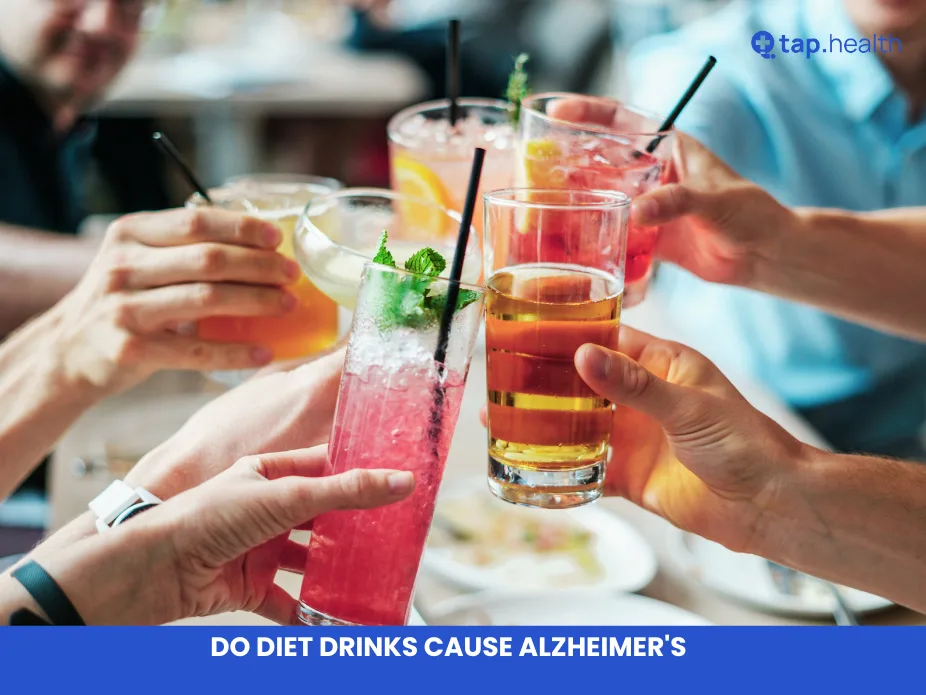Diet drinks have gained popularity as a “healthier” alternative to sugary beverages, but questions remain about their potential long-term health impacts. In recent years, researchers have explored whether these artificially sweetened drinks could contribute to the development of Alzheimer’s disease, a progressive neurodegenerative condition. While there is no definitive answer, growing evidence suggests that diet drinks may have indirect effects on brain health.
Understanding Diet Drinks and Their Ingredients
Diet drinks are sugar-free beverages sweetened with artificial or low-calorie sweeteners such as:
- Aspartame: One of the most commonly used sweeteners, known for its intense sweetness and low calorie count.
- Saccharin: An older artificial sweetener often found in sodas and tabletop packets.
- Sucralose: A popular sugar substitute used in a wide range of diet foods and drinks.
These sweeteners are generally regarded as safe by regulatory bodies, but some studies have linked their consumption to health concerns, including metabolic disorders and potential effects on the brain.
What Does the Research Say About Alzheimer’s and Diet Drinks?
While direct evidence linking diet drinks to Alzheimer’s is limited, some studies highlight potential concerns:
1. Impact on Cognitive Health
A study published in the journal Stroke (2017) found that individuals who consumed one or more artificially sweetened beverages daily were almost three times more likely to develop dementia or stroke compared to those who didn’t consume these drinks. While this does not establish a direct cause, it raises questions about the long-term effects of diet drinks on brain health.
2. Gut-Brain Axis
Artificial sweeteners may disrupt the gut microbiome, which plays a critical role in overall health, including cognitive function. Dysbiosis (imbalance in gut bacteria) has been associated with inflammation and neurological diseases, including Alzheimer’s.
3. Insulin Resistance and Alzheimer’s
Artificial sweeteners have been linked to increased insulin resistance in some individuals. Insulin resistance is a risk factor for type 2 diabetes, which in turn is strongly associated with an increased risk of Alzheimer’s disease.
4. Neurotoxicity of Artificial Sweeteners
There is ongoing debate about whether sweeteners like aspartame have neurotoxic effects. Some studies suggest that excessive consumption of aspartame may affect neurotransmitters, oxidative stress, and inflammation, which could contribute to neurodegenerative conditions.
Real-Life Scenarios
Anita’s Case: A Balanced Approach
Anita, a 55-year-old from Delhi, switched to diet drinks to reduce her sugar intake. Over time, she began experiencing memory lapses and consulted her doctor. While no direct link to Alzheimer’s was found, her doctor advised cutting back on artificial sweeteners and focusing on a whole-food diet for better overall health.
Rajiv’s Experience: Long-Term Use
Rajiv, a 60-year-old IT professional in Bengaluru, consumed diet sodas daily for over 15 years. Concerned about his cognitive health after reading recent studies, he transitioned to natural alternatives like infused water and tea. Regular check-ups showed no signs of cognitive decline, but he reported improved energy levels and mood.
Recommendations Grounded in Proven Research and Facts
While the evidence remains inconclusive, here are some recommendations based on current knowledge:
- Limit Artificial Sweeteners: Occasional consumption is unlikely to cause harm, but frequent or excessive use may have long-term effects on brain and metabolic health.
- Choose Natural Alternatives: Opt for beverages like water, herbal teas, or naturally sweetened drinks (e.g., those using stevia or monk fruit).
- Maintain a Brain-Healthy Diet: Focus on whole foods like vegetables, fruits, nuts, whole grains, and lean proteins. The Mediterranean diet, in particular, has been shown to lower the risk of Alzheimer’s.
- Stay Physically and Mentally Active: Exercise and cognitive activities are proven ways to reduce the risk of Alzheimer’s and other forms of dementia.
Expert Contributions
Dr. Priya Deshmukh, a neurologist from Mumbai, notes, “While we don’t have conclusive evidence linking diet drinks to Alzheimer’s, artificial sweeteners can impact metabolic health and the gut-brain connection. A balanced, natural diet is the best approach for long-term brain health.”
Source: Alzheimer’s Association
FAQ on Do Diet Drinks Cause Alzheimer’s?
Q: Do diet drinks directly cause Alzheimer’s disease?
A: No direct causal link has been established, but some studies suggest an association between frequent consumption and cognitive decline.
Q: Are all artificial sweeteners harmful?
A: Not necessarily. Moderation is key, and different sweeteners may affect individuals differently.
Q: Can cutting out diet drinks improve brain health?
A: Reducing artificial sweeteners may benefit overall health and help mitigate potential risks, but it’s essential to focus on a balanced diet and active lifestyle.
Q: What beverages are safest for brain health?
A: Water, green tea, herbal teas, and drinks sweetened with natural alternatives like honey or stevia are better choices.




